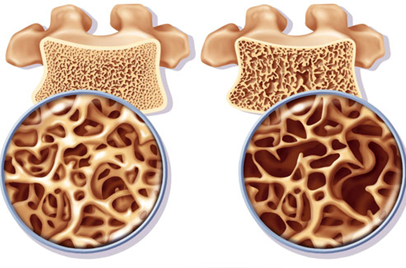The Centers for Advanced Orthopaedics is redefining the way musculoskeletal care is delivered across the region with locations throughout Maryland, DC, Virginia and Pennsylvania.
Smoking Impact on Spine, Discs and Bones
In the United States smoking claims more than 440,000 lives each year. In general, it reduces life expectancy by 7-10 years.
Besides heart and lungs diseases, smoking seriously affects spine, discs, bones and joints
Every tissue in the human body is affected by smoking, but several effects are reversible. By avoiding or quitting smoking, you can reduce your risk for incurring many conditions. Quitting smoking can also help your body regain some of its normal healthy functioning.
Following are the scientific findings that explain the relationship between smoking and musculoskeletal health.
Smoking increases your risk of developing osteoporosis — a weakness of bone that causes fractures. Elderly smokers are 30% to 40% more likely to break their hips than their non-smoking counterparts. Smoking weakens bones in several ways, including:
- Studies have shown that smoking reduces the blood supply to bones, just as it does to many other body tissues.
- The nicotine in cigarettes slows the production of bone-forming cells (osteoblasts) so that they make less bone.
- Smoking decreases the absorption of calcium from the diet. Calcium is necessary for bone mineralization, and with less bone mineral, smokers develop fragile bones (osteoporosis).
- Smoking seems to break down estrogen in the body more quickly. Estrogen is important to build and maintain a strong skeleton in women and men.
Smoking also affects the other tissues that make up the musculoskeletal system, increasing the risk of injury and disease:
- Rotator cuff (shoulder) tears in smokers are nearly twice as large as those in nonsmokers, which is probably related to the quality of these tendons in smokers.
- Smokers are 1.5 times more likely to suffer overuse injuries, such as bursitis or tendonitis, than nonsmokers.
- Smokers are also more likely to suffer traumatic injuries, such as sprains or fractures.
- Smoking is also associated with a higher risk of low back pain and rheumatoid arthritis.
- Smoking is associated with degradation of the intervertebral discs and accelerates disc related back conditions.
Smoking has a detrimental effect on fracture and wound healing.
- Fractures take longer to heal in smokers because of the harmful effects of nicotine on the production of bone-forming cells.
- Smokers also have a higher rate of complications after surgery than nonsmokers — such as poor wound healing and infection — and outcomes are less satisfactory. This is related to the decrease in blood supply to the tissues.
- Smoking has a detrimental effect on athletic performance.
Because smoking slows lung growth and impairs lung function, there is less oxygen available for muscles used in sports.
Smokers suffer from shortness of breath almost three times more often than nonsmokers. Smokers cannot run or walk as fast or as far as nonsmokers.
Smoking can make you too thin and put you at greater risk for fractures. Nicotine signals the brain to eat less and can prevent the body from getting adequate nutrition. Having a good body weight is important for general health.

Healthy Bones Smoker's Bones
Shaheer Yousaf MD
Center For Advanced Orthopedics
Source: AAOS